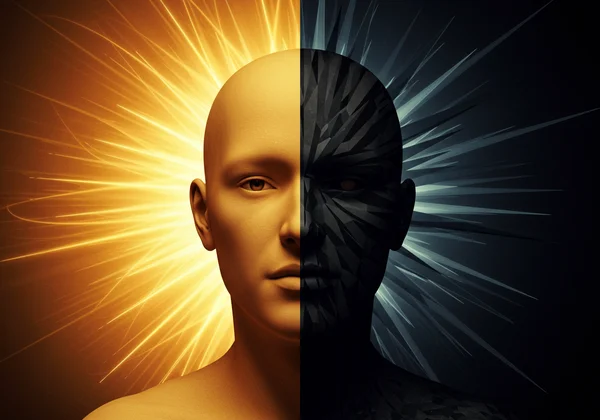Light Triad vs Dark Triad Traits: What a Personality Test Reveals
August 17, 2025 | By Julian Vance
Psychology often focuses on the "dark side" of personality—the manipulative, narcissistic, and unempathetic traits known as the Dark Triad. While understanding these shadows is important, it only tells half the story. What about our capacity for good? A newer concept, the Light Triad, offers a powerful counterpart to the well-known Dark Triad—Machiavellianism, narcissism, and psychopathy. But is that the whole story? While many are curious about their 'dark' traits, what about the 'light'? Does a positive counterpart exist, and what can it reveal about the best parts of human nature and ourselves?
This guide will explore the compelling contrast between the light vs dark triad, shining a light on the compassionate and benevolent side of personality. Understanding this full spectrum is the first step toward genuine self-awareness. To begin uncovering your own unique profile, you can always take a free test on our site.

What is the Light Triad of Personality?
The Light Triad is a psychological framework introduced by researchers Scott Barry Kaufman, David Yaden, Elizabeth Hyde, and Eli Tsukayama. It serves as a counterpart to the well-known Dark Triad, focusing on traits that promote growth, connection, and human goodness. Where the Dark Triad explores a self-serving and often antagonistic approach to life, the Light Triad represents a loving and benevolent orientation toward oneself and others.
These aren't just fluffy concepts; they are measurable personality traits rooted in established psychological principles. The Light Triad is comprised of three core components that, together, paint a picture of our capacity for compassion and altruism.
Kantianism: Treating People as Ends, Not Means
This trait is named after the philosopher Immanuel Kant. At its heart, Kantianism is about seeing the inherent value in every individual. Someone with strong Kantian traits doesn't view people as tools to be used for personal gain. Instead, they treat others with respect and dignity, recognizing that everyone has their own goals, feelings, and life story.
In practice, this means being honest and straightforward in your dealings. It's about refusing to manipulate or deceive others to get what you want. This trait is the direct opposite of the manipulative nature found in Machiavellianism.
Humanism: Valuing the Dignity and Worth of Each Person
Humanism is the belief in the fundamental worth of all human beings. It involves a deep appreciation for the beauty and potential within each person, regardless of their background or flaws. A person with humanistic traits celebrates the successes of others and offers compassion when they struggle.
This perspective fosters a sense of shared community and mutual respect. It drives individuals to be supportive, non-judgmental, and appreciative of others. This stands in stark contrast to the grandiosity and devaluation of others often seen in narcissism.
Faith in Humanity: Believing in the Fundamental Goodness of Others
This trait is about your core belief system. Faith in Humanity is the tendency to trust that people are, at their core, good. It doesn't mean being naive or blind to the fact that people can do harm. Rather, it's an optimistic worldview that gives others the benefit of the doubt and believes in their capacity for kindness and redemption.
This belief encourages forgiveness, cooperation, and hope. It’s the direct opposite of the cynical and distrustful worldview often associated with psychopathy. To see where your own traits might land on this spectrum, a dark triad personality test can offer valuable initial insights.
Light vs Dark Triad: Key Differences Explored
While the Light Triad and Dark Triad are often presented as polar opposites, their differences run deeper than just "good" versus "bad." They represent fundamentally different ways of navigating the world and relating to others. Understanding these core distinctions can help you better identify these patterns in yourself and in those around you.

Motivation: Growth and Connection vs. Exploitation and Power
The primary motivation of a Light Triad personality is to foster connection, understanding, and mutual growth. They find satisfaction in helping others, learning, and contributing to a greater good. Their actions are driven by empathy and a desire for authentic relationships.
Conversely, the Dark Triad personality is primarily motivated by power, dominance, and self-advancement. They are driven to acquire resources, status, and control, often at the expense of others. Their relationships are typically transactional, valued only for what they can provide.
Worldview: Trusting and Forgiving vs. Cynical and Manipulative
An individual leaning toward the Light Triad maintains a trusting and forgiving worldview. They believe in second chances and see the potential for positive outcomes, even in difficult situations. Their optimism is a source of resilience and helps them build strong, lasting bonds.
The Dark Triad worldview is inherently cynical and manipulative. These individuals tend to see the world as a competitive, dog-eat-dog arena. They are often distrustful of others' intentions and believe that manipulation is a necessary tool for survival and success.
Interpersonal Impact: Inspiring Others vs. Causing Harm
The interpersonal impact of a Light Triad individual is generally positive and uplifting. They inspire, support, and empower those around them, fostering environments of safety and collaboration. Their presence can make others feel valued and understood.
In contrast, the impact of a Dark Triad individual is often negative and can cause significant emotional or psychological harm. Their tendencies toward exploitation, entitlement, and a lack of empathy can create toxic dynamics in relationships, workplaces, and communities. Acknowledging these patterns is key to personal growth, and a science-backed test can be a great place to start.
Are You Light or Dark? Understanding the Spectrum
It's tempting to categorize people—including ourselves—into neat boxes. Are you a "light" person or a "dark" person? The reality, however, is far more nuanced and interesting. Psychology teaches us that personality exists on a spectrum, not as a set of binary labels.

Why Most People Have a Mix of Traits
Few people are purely "Light Triad" or purely "Dark Triad." Most of us exist somewhere in the middle, exhibiting a unique blend of different traits. You might have a deep faith in humanity but also possess a competitive drive that can sometimes feel Machiavellian. This combination of mix of traits is not a contradiction; it’s what makes us human.
Context also plays a huge role. A person might show more manipulative traits in a high-stakes corporate environment but be incredibly humanistic and giving with their family. Understanding that these traits can be fluid is essential for accurate self-reflection, and a quality dark triad test can help establish a baseline.
The Importance of Balance for Personal Well-being
True personal well-being isn't about eradicating all "dark" traits and becoming a paragon of "light." In fact, some Dark Triad traits, in small, controlled doses, can be adaptive. A touch of narcissism might fuel healthy self-confidence, and a degree of Machiavellian thinking can help in strategic planning.
The goal is not perfection but balance and self-awareness. Recognizing your tendencies—both light and dark—is the key to harnessing your strengths and managing your challenges. It allows you to make conscious choices about who you want to be, rather than being driven by unconscious patterns. The journey to explore your profile is a journey toward this powerful balance.
Embracing the Full Spectrum of Your Personality
The dialogue between the Light Triad and Dark Triad provides a rich, holistic framework for understanding who we are. It reminds us that human nature is a complex tapestry woven with threads of both light and shadow. Neither side tells the whole story, but together, they offer a map for profound self-exploration.
Embracing this complexity is the key to genuine growth. By understanding our capacity for both compassion and competition, for both trust and cynicism, we can navigate our lives with greater wisdom and intention. The journey begins with the courage to look honestly at your own unique profile.
Curious about your own blend of traits? While a specific Light Triad test provides one perspective, understanding your Dark Triad tendencies is a powerful and foundational first step. Take our free, science-backed Dark Triad test today to gain crucial insights for your personal growth journey.
Frequently Asked Questions About Personality Triads
Can a Dark Triad person fall in love?
This is a complex question. Individuals with strong Dark Triad traits, particularly psychopathy, have a diminished capacity for empathy and forming deep emotional bonds, which are central to what most people consider love. They may form relationships based on convenience, status, or excitement, and can be very skilled at mimicking the emotions of love. However, experiencing the genuine, selfless, and empathetic connection of love is often very difficult for them.
What is the difference between a Dark Empath and a Dark Triad?
The "Dark Empath" is a newer concept suggesting a person who possesses Dark Triad traits (manipulation, narcissism) but also has cognitive empathy—the ability to understand what others are feeling. This is different from affective empathy (feeling what others feel). This understanding makes them particularly effective manipulators, as they can precisely target others' emotional vulnerabilities. The core Dark Triad, especially psychopathy, is typically defined by a lack of both types of empathy.
Are Dark Triad traits always bad?
While Dark Triad traits are linked to negative outcomes and are socially undesirable, labeling them as "always bad" is an oversimplification. In certain contexts, some of these traits might be advantageous. For example, a surgeon's low anxiety (a psychopathic trait) or a leader's strategic thinking (a Machiavellian trait) could be beneficial in their roles. However, the self-serving motivation behind these traits means they carry a high risk of harming others. The key to understanding them is through a reliable assessment like a free dark triad test.
Disclaimer: This article is for educational and informational purposes only. The content and the test offered on this site are not a substitute for professional psychological advice, diagnosis, or treatment. Always seek the advice of a qualified mental health provider with any questions you may have regarding a medical condition.